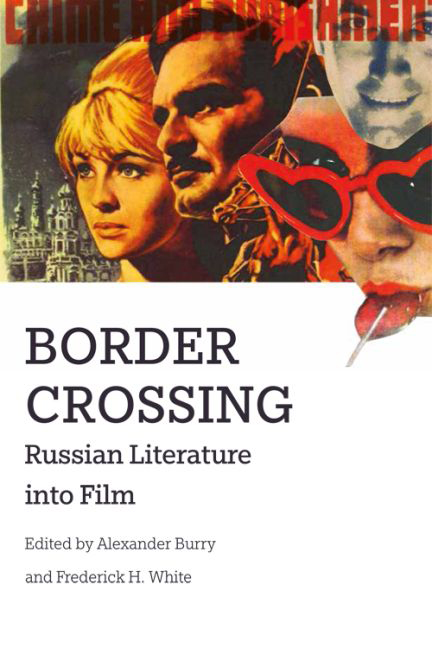Book contents
- Frontmatter
- Contents
- List of Figures
- Notes on the Contributors
- Introduction: Filming Russian Classics—Challenges and Opportunities
- 1 Across the Russian Border
- 2 Dostoevskii's “White Nights”: The Dreamer Goes Abroad
- 3 On Not Showing Dostoevskii's Work: Robert Bresson's Pickpocket
- 4 Stealing the Scene: Crime as Confession in Robert Bresson's Pickpocket
- 5 The Eye-deology of Trauma: Killing Anna Karenina Softly
- 6 “A Vicious Circle”: Karen Shakhnazarov's Ward no. 6
- 7 A Slap in the Face of American Taste: Transporting He Who Gets Slapped to American Audiences
- 8 Against Adaptation? The Strange Case of (Pod) Poruchik Kizhe
- 9 Chasing the Wealth: The Americanization of Il'f and Petrov's The Twelve Chairs
- 10 Fassbinder's Nabokov—From Text to Action: Repressed Homosexuality, Provocative Jewishness, and Anti-German Sentiment
- 11 “The Soviet Abroad (That We Lost)”: The Fate of Vasilii Aksenov's Cult Novel A Starry Ticket on Paper and on Screen
- Conclusion: Passport Control—Departing on a Cinematic Journey
- Bibliography
- Filmography
- Index
11 - “The Soviet Abroad (That We Lost)”: The Fate of Vasilii Aksenov's Cult Novel A Starry Ticket on Paper and on Screen
- Frontmatter
- Contents
- List of Figures
- Notes on the Contributors
- Introduction: Filming Russian Classics—Challenges and Opportunities
- 1 Across the Russian Border
- 2 Dostoevskii's “White Nights”: The Dreamer Goes Abroad
- 3 On Not Showing Dostoevskii's Work: Robert Bresson's Pickpocket
- 4 Stealing the Scene: Crime as Confession in Robert Bresson's Pickpocket
- 5 The Eye-deology of Trauma: Killing Anna Karenina Softly
- 6 “A Vicious Circle”: Karen Shakhnazarov's Ward no. 6
- 7 A Slap in the Face of American Taste: Transporting He Who Gets Slapped to American Audiences
- 8 Against Adaptation? The Strange Case of (Pod) Poruchik Kizhe
- 9 Chasing the Wealth: The Americanization of Il'f and Petrov's The Twelve Chairs
- 10 Fassbinder's Nabokov—From Text to Action: Repressed Homosexuality, Provocative Jewishness, and Anti-German Sentiment
- 11 “The Soviet Abroad (That We Lost)”: The Fate of Vasilii Aksenov's Cult Novel A Starry Ticket on Paper and on Screen
- Conclusion: Passport Control—Departing on a Cinematic Journey
- Bibliography
- Filmography
- Index
Summary
One piece of information with which we like to startle our students when teaching film and adaptation theory is that at least half of all films produced worldwide can trace their origin to some literary text. Statistically, one out of two movies we watch is not a “film,” but a “book-to-film adaptation.” Usually, we like to add another piece of information that is equally revealing, namely that quite often successful and popular films are based on mediocre and forgotten novels. How many people are aware of the fact that it was a short story by Daphne du Maurier (1952) that inspired Alfred Hitchcock to make his classic The Birds (1963)? How many Western viewers of Andrei Tarkovskii's Stalker (1979) are familiar with the sci-fi novel by the Strugatskii brothers on which it is based?
If the one-out-of-two-films argument is intended to trigger preconceived notions about the superiority of literature, the film-might-be-better-thanthe- book argument has the opposite function: It questions the primacy of literature and, by implication, the “derivative” nature of film adaptions. Is the difference between the two really that substantial, especially where the perception of the viewer is concerned? Is not the lasting popularity of films based on forgotten novels evidence of their artistic self-sufficiency and independence from their source texts?
Posing these questions in such general terms may be a legitimate way of starting a theoretical discussion in class, but what about the specific historical context in which film adaptations are produced and then received? Some novels (or plays for that matter) may initially enjoy considerable success and then be eclipsed by their screen versions. In Russian cinema, the classic example is The Cranes Are Flying (1957), based on Viktor Rozov's moderately successful play Forever Alive (1956), which earned such international accolades that the source text was almost entirely forgotten. A forgotten text, however, can also be “resurrected” when it is successfully adapted for the screen.
- Type
- Chapter
- Information
- Border CrossingRussian Literature into Film, pp. 223 - 238Publisher: Edinburgh University PressPrint publication year: 2016

